Lucinda Williams | ||
| Allmusic Biography : The object of cult-ish adoration for years, singer/songwriter Lucinda Williams was universally hailed as a major talent by both critics and fellow musicians, but it took quite some time for her to parlay that respect into a measure of attention from the general public. Part of the reason was her legendary perfectionism: Williams released records only infrequently, often taking years to hone both the material and the recordings thereof. Plus, her early catalog was issued on smaller labels that agreed to her insistence on creative control but didnt have the resources or staying power to fully promote her music. Yet her meticulous attention to detail and staunch adherence to her own vision were exactly what helped build her reputation. When Williams was at her best (and she often was), even her simplest songs were rich in literary detail, from her poetic imagery to her flawed, conflicted characters. Her singing voice, whose limitations she readily acknowledged, nonetheless developed into an evocative instrument that seemed entirely appropriate to her material. So if some critics described Williams as "the female Bob Dylan," they may have been oversimplifying things (Townes Van Zandt might be more apt), but the parallels were certainly too strong to ignore. Williams was born in Lake Charles, Louisiana, on January 26, 1953. Her father was Miller Williams, a literature professor and published poet who passed on not only his love of language, but also of Delta blues and Hank Williams. The family moved frequently, as Miller took teaching posts at colleges around Louisiana, Mississippi, Georgia, Arkansas, and even Mexico City and Santiago, Chile. Meanwhile, Lucinda discovered folk music (especially Joan Baez) through her mother and was galvanized into trying her own hand at singing and writing songs after hearing Dylans Highway 61 Revisited. Immersed in a college environment, she was also exposed to 60s rock and more challenging singer/songwriters like Leonard Cohen and Joni Mitchell. She started performing folk songs publicly in New Orleans and during the familys sojourn in Mexico City. In 1969, she was ejected from high school for refusing to say the Pledge of Allegiance, and she spent a year working her way through a reading list supplied by her father before leaving home. Williams performed around New Orleans as a folk artist who mixed covers with traditional-styled originals. In 1974, she relocated to Austin, Texas, and became part of that citys burgeoning roots music scene; she later split time between Austin and Houston, and then moved to New York. A demo tape got her the chance to record for the Smithsonian Folkways label, and she went to Jackson, Mississippi, to lay down her first album at the Malaco studios. Ramblin on My Mind (later retitled simply Ramblin) was released in 1979 and featured a selection of traditional blues, country, folk, and Cajun songs. Williams returned to Houston to record the follow-up, 1980s Happy Woman Blues. As her first album of original compositions, it was an important step forward, and although it was much more bound by the dictates of tradition than her genre-hopping later work, her talent was already in evidence. However, it would be some time before that talent was fully realized. Williams flitted between Austin and Houston during the early 80s, then moved to Los Angeles in 1984, where she started to attract some major-label interest. CBS signed her to a development deal in the mid-80s but wound up passing since neither its rock nor its country divisions knew how to market her; around the same time, a short-lived marriage to drummer Greg Sowders dissolved. Williams eventually caught on with an unlikely partner -- the British indie label Rough Trade, which was historically better known for its punk output. The simply titled Lucinda Williams was released in 1988, and although it didnt make any waves in the mainstream, it received glowing reviews from those who did hear it. With help from guitarist/co-producer Gurf Morlix, Williams sound had evolved into a seamless blend of country, blues, folk, and rock; while it made perfect sense to roots music enthusiasts, it didnt fit into the rigid tastes of radio programmers. But it was clear that she had found her songwriting voice -- the album brimmed with confidence, and so did its assertive female characters, who seemed to answer only to their own passions. Many critics hailed Lucinda Williams as a major statement by a major new talent. Rough Trade issued a couple of EPs that featured live performances and material from Lucinda Williams, and Patty Loveless covered "The Nights Too Long" for a Top 20 country hit. However, it would be four years before Williams completed her official follow-up. She signed with RCA for a time but left when she felt that the label was pressuring her to release material she didnt deem ready for public consumption. Instead, she went to the small Elektra-distributed label Chameleon, which finally released Sweet Old World in 1992. A folkier outing than Lucinda Williams, Sweet Old World was an unflinching meditation on death, loss, and regret. Even its upbeat moments were colored by songs like the title track and "Pineola," two stunning, heartbreaking accounts of a family friends suicide (poet Frank Stanford, not, as many listeners assumed, Williams own brother). Needless to say, the record won rave reviews once again, and Williams toured Australia with Rosanne Cash and Mary Chapin Carpenter. On that tour, Carpenter decided to record "Passionate Kisses," the key track and statement of purpose from Lucinda Williams. It shot into the country Top Five in 1993 and won its writer a Grammy for Country Song of the Year. Other artists soon started mining Williams back catalog for material: avowed fan Emmylou Harris recorded "Crescent City" on 1993s Cowgirls Prayer and cut "Sweet Old World" for her 1995 alternative country landmark Wrecking Ball; and Tom Petty covered "Changed the Locks" for 1996s movie-related Shes the One. As the buzz around Williams grew, so did anticipation for her next album. With Chameleon having gone under, she signed with Rick Rubins American Recordings label and began sessions with Morlix again co-producing. Dissatisfied with the results, Williams rigorous retouchings led to Morlixs departure from the project. In 1995, she moved into Harris neighborhood in Nashville and through Harris hired Steve Earle and his production partner Ray Kennedy. At first, she was so enamored with their work that she re-recorded the entire album from scratch. When it was finished, she decided that the results sounded too produced, and took the record to Los Angeles, where she enlisted Roy Bittan (onetime E Street Band keyboardist) to co-produce a series of overdub sessions that bordered on obsessive. During the long wait for the album, the media began to pay more attention to Williams; some of the coverage was fairly unflattering, painting her as a neurotic control freak, but she always countered that it was unfair to criticize the process if the results were worthwhile. Rubin mixed the final tracks, but the album was further delayed when he entered into negotiations to sell the American label. Mercury stepped in to purchase the rights to the album, which was finally released in 1998 under the title Car Wheels on a Gravel Road. Boasting a bright, contemporary roots rock sound with strong country and blues flavors, not to mention major-label promotional power, the album won universal acclaim, making many critics year-end Top Ten lists and winning The Village Voices prestigious Pazz & Jop survey. It also won Williams a Grammy for Best Contemporary Folk Album (despite being the least folk-oriented record in her catalog) and became her first to go gold, proving to doubters that she was not just a songwriter, but a full-fledged recording artist in her own right. After a merger shakeup at Mercury, Williams wound up on the Universal-distributed roots imprint Lost Highway. She was the subject of an extensive, widely acclaimed profile in The New Yorker in 2000, written by Bill Buford, who was nominated for a National Magazine Award for his work; however, Williams and some of her supporters took issue with some of his more objective-minded analysis. Williams delivered her next album, Essence, in 2001, after a relatively scant wait of just three years. An introspective collection, it often found Williams taking a simpler, more minimalist lyrical approach and was greeted with rapturous reviews in most quarters. The track "Get Right with God" won Williams her third Grammy, this time for Best Female Rock Vocal, which further consolidated her credibility as a singer, not just a songwriter. Paring down the time between album releases even further, Williams returned in 2003 with World Without Tears, which became her highest-charting effort to date when it debuted in the Top 20. Two live recordings were released in 2005, one (Live @ the Fillmore) for Lost Highway and the other (Live from Austin, TX) for New West. West arrived in 2007, followed by Little Honey in 2008. Williams returned to the studio in 2010 with producer Don Was at the helm with help from Eric Liljestrand and husband/manager Tom Overby (the latter two co-produced Little Honey), with some of the same guests from her previous offering, including Matthew Sweet and Elvis Costello, who sang and played on almost half the record. (Costello and Williams had already worked together; she dueted with Costello on his 2004 album The Delivery Man.) Entitled Blessed, the album was released in early 2011 in two editions, one a standard CD and the other as a limited deluxe version with a bonus disc that included the working demos for the songs on Blessed, recorded in Williams kitchen. In early 2014, Williams reissued her 1988 self-titled album with bonus material via funding from a PledgeMusic campaign. If the crowd-funding campaign suggested Williams was moving away from the standard music business paradigm, she confirmed it by forming her own record label, Highway 20 Records, which released Down Where the Spirit Meets the Bone, an ambitious two-disc set that appeared in September 2014. Apparently inspired by her new independence, Williams released another double album, The Ghosts of Highway 20, through her own label in February 2016, only a year-and-a-half after Down Where the Spirit Meets the Bone. In 2017, Williams marked the 25th anniversary of Sweet Old World with the release of This Sweet Old World, in which she recorded new and sometimes revised versions of the songs from the 1992 album, accompanied by her road band. | ||
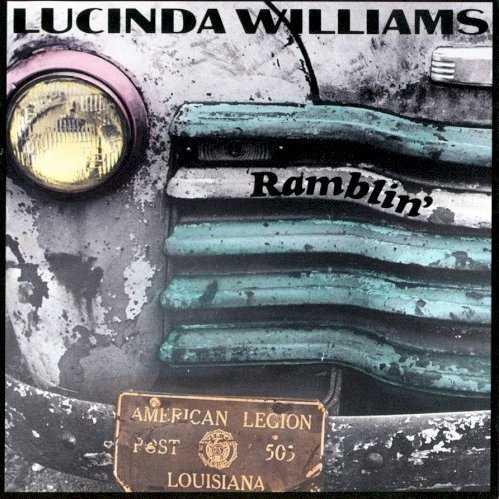 | Album: 1 of 19 Title: Ramblin Released: 1979 Tracks: 14 Duration: 44:18 Scroll: Up Down Top Bottom 25% 50% 75% Spotify Allmusic Wikipedia AlbumCover | 1 Ramblin on My Mind (02:35) 2 Me and My Chauffeur (03:16) 3 Motherless Children (03:35) 4 Malted Milk Blues (02:34) 5 Disgusted (02:33) 6 Jug Band Music (02:27) 7 Stop Breakin Down (03:24) 8 Drop Down Daddy (03:25) 9 Little Darling Pal of Mine (03:04) 10 Make Me Down a Pallet on Your Floor (03:53) 11 Jambalaya (On the Bayou) (03:09) 12 Great Speckled Bird (03:00) 13 Youre Gonna Need that Pure Religion (03:12) 14 Satisfied Mind (04:06) |
| Ramblin' : Allmusic album Review : A collection of blues and country standards by Robert Johnson, Memphis Minnie, Hank Williams, and others. Williams is accompanied only by guitarist John Grimaudo. Re-released by Smithsonian/Folkways in 1991 as Ramblin. | ||
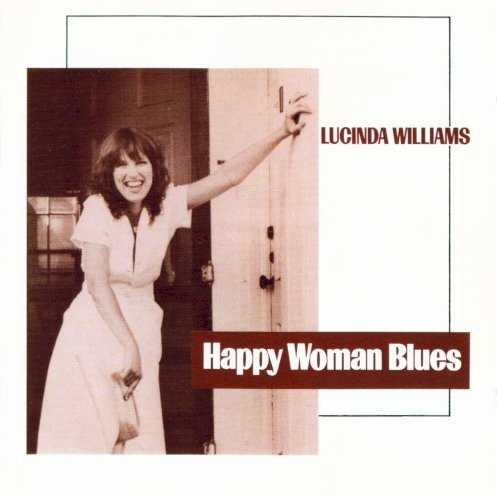 | Album: 2 of 19 Title: Happy Woman Blues Released: 1980 Tracks: 11 Duration: 35:45 Scroll: Up Down Top Bottom 25% 50% 75% Spotify Allmusic Wikipedia AlbumCover | 1 Lafayette (03:46) 2 I Lost It (02:56) 3 Maria (03:48) 4 Happy Woman Blues (03:12) 5 King of Hearts (04:05) 6 Rolling Along (02:50) 7 One Night Stand (02:55) 8 Howlin at Midnight (03:53) 9 Hard Road (02:25) 10 Louisiana Man (02:26) 11 Sharp Cutting Wings (Song to a Poet) (03:26) |
| Happy Woman Blues : Allmusic album Review : Lucinda Williams first collection of original material -- recorded with a full band -- is stunning for its mixture of blues, folk, and country traditions with her captivating, complex, and visceral approach to writing and singing. Songs like "Lafayette," "King of Hearts," and "Sharp Cutting Wings" are classics: structurally solid and emotionally intense. A gutsy, refreshingly rootsy album. | ||
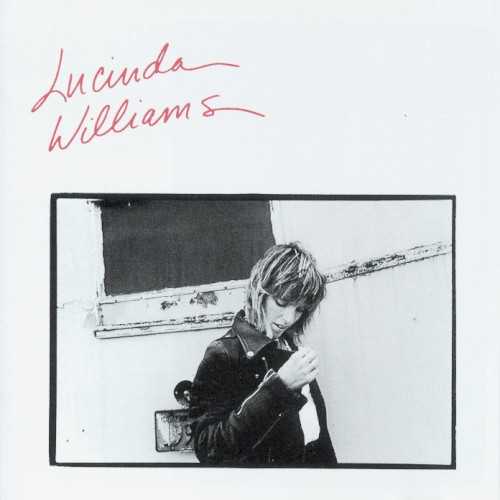 | Album: 3 of 19 Title: Lucinda Williams Released: 1988 Tracks: 12 Duration: 39:00 Scroll: Up Down Top Bottom 25% 50% 75% Spotify TrackSamples Allmusic Wikipedia AlbumCover | 1 I Just Wanted to See You So Bad (02:26) 2 The Nights Too Long (04:17) 3 Abandoned (03:48) 4 Big Red Sun Blues (03:29) 5 Like a Rose (02:38) 6 Changed the Locks (03:44) 7 Passionate Kisses (02:38) 8 Am I Too Blue (02:57) 9 Crescent City (03:01) 10 Side of the Road (03:27) 11 Price to Pay (02:51) 12 I Asked for Water (He Gave Me Gasoline) (03:42) |
| Lucinda Williams : Allmusic album Review : Lucinda Williams took eight years to write and record her second album of original songs. While some producers and record executives have said that she is difficult to work with, one can never argue with the finished product. She crafts each song meticulously and deftly blends country, blues, and folk to create a unique sound that cannot be pigeonholed into any particular format. Her voice contains a heartache comparable to Emmylou Harris, but she has a darker side and a toughness that allows her to live inside the blues or rock with abandon. Re-released with bonus tracks after receiving long overdue commercial acclaim for Car Wheels on a Gravel Road, Lucinda Williams is an album that has been long been recognized as a classic. It has been mined for hit songs over the years by such artists as Mary Chapin Carpenter, who turned "Passionate Kisses" into a country hit, and Tom Petty, who included "Changed the Locks" on his soundtrack album Shes the One. In addition to writing strong melodies, Williams is an amazing songwriter with a knack for writing a lyric that acknowledges the complicated nature of relationships while cutting right to the heart of the matter. Every song packs an emotional punch line and rewards the listener each time with something new. A must-own for country and blues fans who appreciate great songwriting. | ||
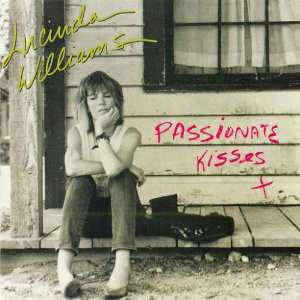 | Album: 4 of 19 Title: Passionate Kisses Released: 1989 Tracks: 5 Duration: 16:24 Scroll: Up Down Top Bottom 25% 50% 75% AlbumCover | 1 Passionate Kisses (02:38) 2 Nothing in Rambling (03:12) 3 Disgusted (03:24) 4 Goin Back Home (03:11) 5 Side of the Road (03:56) |
 | Album: 5 of 19 Title: I Just Wanted to See You So Bad Released: 1989 Tracks: 5 Duration: 15:51 Scroll: Up Down Top Bottom 25% 50% 75% AlbumCover | 1 I Just Wanted to See You So Bad (02:30) 2 Something About What Happens When We Talk (03:25) 3 Sundays (03:29) 4 Changed the Locks (03:47) 5 Like a Rose (02:37) |
 | Album: 6 of 19 Title: Sweet Old World Released: 1992-08-25 Tracks: 12 Duration: 45:19 Scroll: Up Down Top Bottom 25% 50% 75% Spotify Wikipedia Allmusic AlbumCover | 1 Six Blocks Away (02:52) 2 Something About What Happens When We Talk (03:47) 3 He Never Got Enough Love (03:52) 4 Sweet Old World (04:03) 5 Little Angel, Little Brother (04:25) 6 Pineola (04:10) 7 Lines Around Your Eyes (02:29) 8 Prove My Love (02:48) 9 Sidewalks of the City (03:44) 10 Memphis Pearl (03:48) 11 Hot Blood (05:27) 12 Which Will (03:50) |
| Sweet Old World : Allmusic album Review : After seemingly coming out of nowhere to be hailed as a major songwriter and roots music stylist, it took Lucinda Williams four years to prepare the follow-up to her masterful 1988 eponymous album. When it finally arrived, Sweet Old World proved to be every bit the equal of its predecessor, if not even better. Although Sweet Old World isnt really a concept album, it often feels like one. Its first half is dominated by the title track and "Pineola," two stunning meditations on suicide. Their sense of tragedy is reinforced with the closing cover of Nick Drakes "Which Will," and their shadow hangs heavy over the rest of the album. Several character portraits ponder where and why their subjects lives went wrong; in this context, the dead-end situations seem that much more tragic and final. Moreover, when Williams offers an emotionally complex love ballad or a sexy blues strut, its hard to take them as truly celebratory; here, the singer sounds as though she wants to appreciate who she has while she still can. Thats also why "Little Angel, Little Brother" doesnt come off as remotely sentimental; the affectionate tribute works so well that, sandwiched between "Sweet Old World" and "Pineola," Williams brother sounds like the suicide victim (it was actually a family friend). Williams voice glows with the same warmth, for although its limited in range, its also a gorgeous instrument that WIlliams has learned to manipulate for maximum impact. Stylistically, Sweet Old World is similar to Lucinda Williams, juggling both the sounds and instruments of country, folk, blues, and rock & roll. It might not explode with confidence in the manner of Lucinda Williams, but Sweet Old World is no less vital; its a gorgeous, elegiac record that not only consolidates but expands Williams ample talents. | ||
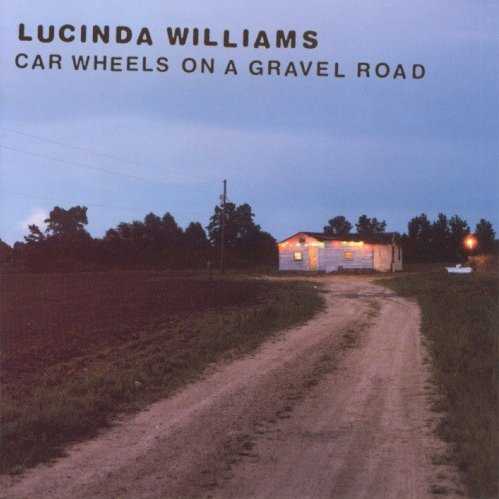 | Album: 7 of 19 Title: Car Wheels on a Gravel Road Released: 1998-06-30 Tracks: 13 Duration: 51:48 Scroll: Up Down Top Bottom 25% 50% 75% Spotify TrackSamples Allmusic AlbumCover | 1 Right in Time (04:36) 2 Car Wheels on a Gravel Road (04:44) 3 2 Kool 2 Be 4-Gotten (04:42) 4 Drunken Angel (03:20) 5 Concrete and Barbed Wire (03:08) 6 Lake Charles (05:28) 7 Cant Let Go (03:28) 8 I Lost It (03:31) 9 Metal Firecracker (03:30) 10 Greenville (03:23) 11 Still I Long for Your Kiss (04:09) 12 Joy (04:01) 13 Jackson (03:42) |
| Car Wheels on a Gravel Road : Allmusic album Review : It isnt surprising that Lucinda Williams level of craft takes time to assemble, but the six-year wait between Sweet Old World and its 1998 follow-up, Car Wheels on a Gravel Road, still raised eyebrows. The delay stemmed both from label difficulties and Williams meticulous perfectionism, the latter reportedly over a too-produced sound and her own vocals. Listening to the record, one can understand why both might have concerned Williams. Car Wheels is far and away her most produced album to date, which is something of a mixed blessing. Its surfaces are clean and contemporary, with something in the timbres of the instruments (especially the drums) sounding extremely typical of a late-90s major-label roots-rock album. While that might subtly alter the timeless qualities of Williams writing, theres also no denying that her sound is punchier and livelier. The production also throws Williams idiosyncratic voice into sharp relief, to the point where its noticeably separate from the band. As a result, every inflection and slight tonal alteration is captured, and it would hardly be surprising if Williams did obsess over those small details. But whether or not you miss the earthiness of Car Wheels predecessors, its ultimately the material that matters, and Williams songwriting is as captivating as ever. Intentionally or not, the albums common thread seems to be its strongly grounded sense of place -- specifically, the Deep South, conveyed through images and numerous references to specific towns. Many songs are set, in some way, in the middle or aftermath of not-quite-resolved love affairs, as Williams meditates on the complexities of human passion. Even her simplest songs have more going on under the surface than their poetic structures might indicate. In the end, Car Wheels on a Gravel Road is Williams third straight winner; although she might not be the most prolific songwriter of the 90s, shes certainly one of the most brilliant. | ||
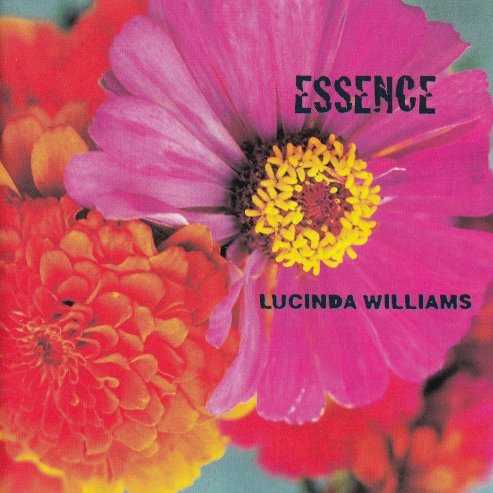 | Album: 8 of 19 Title: Essence Released: 2001-06-05 Tracks: 11 Duration: 51:03 Scroll: Up Down Top Bottom 25% 50% 75% Spotify Allmusic AlbumCover | 1 Lonely Girls (04:02) 2 Steal Your Love (03:17) 3 I Envy the Wind (03:15) 4 Blue (03:55) 5 Out of Touch (05:30) 6 Are You Down (05:28) 7 Essence (05:54) 8 Reason to Cry (03:44) 9 Get Right With God (04:19) 10 Bus to Baton Rouge (05:53) 11 Broken Butterflies (05:40) |
| Essence : Allmusic album Review : Between her well-documented determination to retail full control of her music and the plain-spoken willfulness of her best-known songs, Lucinda Williams is practically the working definition of a strong woman you do not want to mess with, but she reveals a very different side of her musical personality on her sixth album, Essence. Subtle and often stark, Essence is an unusually quiet and frequently downbeat set that depicts a fragile emotional vulnerability which rarely makes its presence felt in Williams music; theres an unadorned longing in songs like "Blue" and "Lonely Girls" thats new and deeply affecting, and the leaf-in-the-breeze quaver of Williams voice on "I Envy the Wind" is as heart-rending as anything shes ever committed to tape. But while a blue mood dominates Essence, this isnt an album about the blue funk of heartbreak, but a chronicle of the search for transcendence over sorrow in our lives, as her characters look for a path out of isolation ("Out of Touch"), try to find answers through faith ("Get Right With God"), or reconcile love with the desires of the flesh ("Essence"). As a songwriter, Williams has long shown a knack for charting the human heart and mind with intelligence and economy, and Essence finds her at the peak of her form; the delicacy of this music does not speak of weakness, but of the passion and bravery it takes to bare ones soul. And while Williams has gained a certain infamy for her obsessive perfectionism in the studio, the quality of her work speaks for the wisdom of her decision-making process, and Essence proves how well she understands the art of recording; producing in collaboration with Charlie Sexton (Tom Tucker and Bo Ramsey also contributed), Essence sounds full and rich even in its quietest moments, and her sweet-and-sour voice blends with the arrangements with subtle perfection. Those hoping for another dose of the bluesy roots rock of Car Wheels on a Gravel Road may be disappointed, but if you want to take a deep and compelling look into the heart and soul of a major artist, then you owe it to yourself to hear Essence. | ||
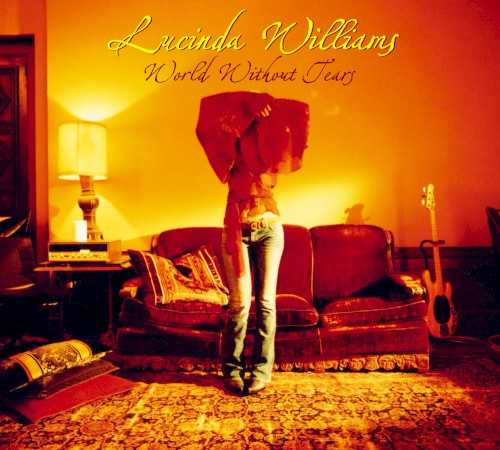 | Album: 9 of 19 Title: World Without Tears Released: 2003-04-07 Tracks: 13 Duration: 59:52 Scroll: Up Down Top Bottom 25% 50% 75% Spotify TrackSamples Allmusic Wikipedia AlbumCover | 1 Fruits of My Labor (04:49) 2 Righteously (04:41) 3 Ventura (04:43) 4 Real Live Bleeding Fingers and Broken Guitar Strings (04:43) 5 Overtime (03:58) 6 Those Three Days (04:59) 7 Atonement (05:50) 8 Sweet Side (03:37) 9 Minneapolis (04:08) 10 People Talkin (05:11) 11 American Dream (04:38) 12 World Without Tears (04:17) 13 Words Fell (04:14) |
| World Without Tears : Allmusic album Review : While many considered Car Wheels on a Gravel Road and Essence as definitive statements of arrival for Lucinda Williams as a pop star, she "arrived" creatively with her self-titled album in 1988 and opened up a further world of possibilities with Sweet Old World. The latter two records merely cemented a reputation that was well-deserved from the outset, though they admittedly confused some of her earliest fans. World Without Tears is the most immediate, unpolished album shes done since Sweet Old World. In addition, it is simply the bravest, most emotionally wrenching record shes ever issued. It offers unflinching honesty regarding the paradoxes inherent in love as both a necessary force for fulfillment and a destructive one when embraced unconsciously. Fans of her more polished, emotionally yearning material may have a hard time here because there isnt one track -- of 13 -- that isnt right from the gut, ripped open, bleeding, and stripped of metaphors and literary allusions; theyre all cut with the fineness of a stiletto slicing through white bone into the hearts blood. World Without Tears is, among other things, predominantly about co-dependent, screwed-up love. Its about relationships that begin seemingly innocently and well-intentioned and become overwhelmingly powerful emotionally and transcendent sexually, until the moment where a fissure happens, baggage gets dumped in the space between lovers, and they turn in on themselves, becoming twisted and destructive -- where souls get scorched and bodies feel the addictive, obsessive need to be touched by a now absent other. The whole experience burns to ashes; it becomes a series of tattoos disguised as scars. The experience is lived through with shattering pain and bewilderment until wrinkled wisdom emerges on the other side. Most of Williams albums have one song that deals with this theme, but with the exception of a couple of songs, here they all do. Musically, this is the hardest-rocking record shes ever released, though almost half the songs are ballads. Her road band -- on record with her for the first time -- cut this one live from the studio floor adding keyboards and assorted sonic textures later. The energy here just crackles. Sure, theres gorgeous country and folk music here. "Ventura," with its lilting verse and lap steel whining in the background, is a paean to be swallowed up in the ocean of loves embrace. In fact, its downright prosaic until she gets to the last verse: "Stand in the shower to clean this dirty mess/Give me back my power and drown this unholiness/Lean over the toilet bowl and throw up my confession/Cleanse my soul of this hidden obsession." The melodic frame is still moving, but the tune reverses itself: Its no longer a broken-hearted ballad, but a statement of purpose and survival. "Fruits of My Labor" is a straight-ahead country song. Williams shimmers with her lyric, her want pouring from her mouth like raw dripping honey. Her words are a poetry of want: "I traced your scent through the gloom/Till I found these purple flowers/I was spent, I was soon smelling you for hours...Ive been trying to enjoy all the fruits of my labor/Ive been cryin for you boy, but truth is my savior." One can hear the grain of Loretta Lynns voice, with an intent so pure and unadorned. But the muck and mire of "Righteously," with its open six-string squall, is pure rock. Its an exhortation to a lover that he need not prove his manhood by being aloof, but to "be the man you ought to tenderly/Stand up for me." Doug Pettibones overdriven, crunching guitar solo quotes both Duane Allman and Jimi Hendrix near the end of the tune. "Real Live Bleeding Fingers and Broken Guitar Strings" is a Rolling Stones-style country-rocker with a lyric so poignant it need not be quoted here. "Over Time," a tome about getting through the heartbreak of a ruined relationship, could have been produced by Daniel Lanois with its warm guitar tremolo and sweet, pure, haunting vocal in front of the mix. "Those Three Days" may be the most devastating song on the record, with its whimpering lap steel and Williams half-spoken vocal that questions whether a torrid three-day affair was a lie, a symbolic sacrifice, or the real thing. The protagonists vulnerability is radical; she feels used, abused -- "Did you only want me for those three days/Did you only need me for those three days/Did you love me forever just for those three days." Yet she holds out hope that there is some other explanation as the questions begin to ask themselves from the depth of a scorched heart and a body touched by something so powerful it feels as if it no longer owns itself. Pettibones solo screams and rings in the bridge to underline every syllable and emotion. "Atonement" is something else altogether; its a punkish kind of blues. If the White Stripes jammed with 20 Miles in a big studio it might sound like this, with Williams singing from the depths of a tunnel for a supreme megaphone effect. She growls and shouts and spits her lyrics from the center of the mix. And Taras Prodaniuks fuzzed-out basement-level gutter bass is the dirtiest, raunchiest thing on record since early Black Sabbath. "Sweet Side" is almost a poem in song, attempts to inspire someone whos been broken by life to accept his goodness. It is not a rap song despite whats been written about it so far. Its more in the tradition of Bob Dylans early talking blues, but with a modern organic rhythm played by Jim Christie instead of drum loops. In addition, there is the gorgeously tough "People Talking," the most straight-ahead country song Williams has written since "Still I Long for Your Kiss" (from the Horse Whisperer soundtrack, not the version that appears on Car Wheels, which is dull and lifeless by comparison). Here again, Pettibones guitar and the slippery, skittering shuffle of Christies drumming carry Williams voice to a place where she can sing her protagonists personal, soul-searing truth without restraint. World Without Tears is a work of art in the Henry James sense; it is "that which can never be repeated." It is as fine an album as she could make at this point in her life -- which is saying plenty. While she has never strayed from her own vision and has made few compromises, this album risks everything shes built up to now. The audience shes won over time -- especially with her last two records -- may find it over the top, which would be too damn bad; itd be their loss. Hopefully, history will prove that World Without Tears sets a new watermark for Williams, and is an album so thoroughly ahead of its time in the way it embraces, and even flaunts, loves contradictions and paradoxes -- the same way the human heart does. | ||
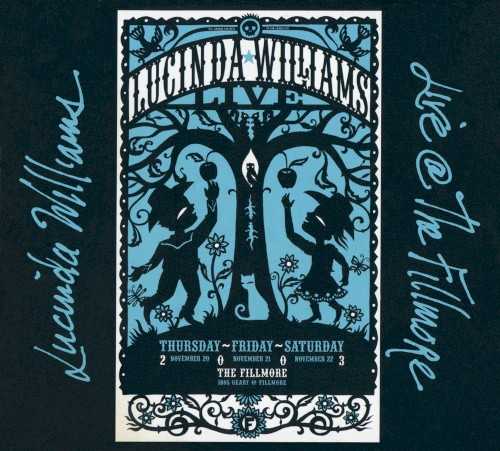 | Album: 10 of 19 Title: Live @ the Fillmore Released: 2005-05-10 Tracks: 22 Duration: 1:55:34 Scroll: Up Down Top Bottom 25% 50% 75% Spotify Wikipedia AlbumCover | 1 Ventura (05:06) 2 Reason to Cry (04:22) 3 Fruits of My Labor (05:04) 4 Out of Touch (07:21) 5 Sweet Side (04:45) 6 Lonely Girls (04:28) 7 Overtime (04:16) 8 Blue (04:22) 9 Changed the Locks (04:07) 10 Atonement (05:58) 1 I Lost It (03:27) 2 Pineola (04:04) 3 Righteously (04:55) 4 Joy (08:19) 5 Essence (07:16) 6 Real Live Bleeding Fingers and Broken Guitar Strings (04:57) 7 Are You Down (06:29) 8 Those Three Days (05:02) 9 American Dream (05:23) 10 World Without Tears (04:42) 11 Bus to Baton Rouge (06:26) 12 Words Fell (04:34) |
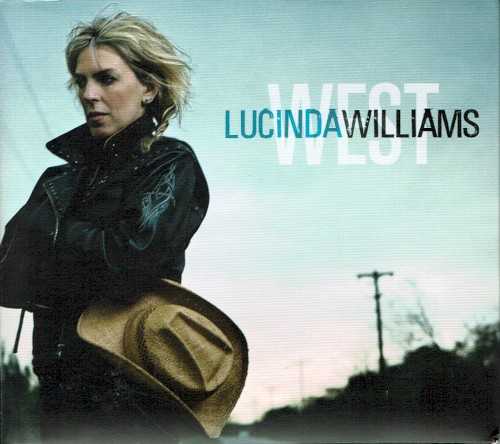 | Album: 11 of 19 Title: West Released: 2007-02-13 Tracks: 13 Duration: 1:08:43 Scroll: Up Down Top Bottom 25% 50% 75% Spotify Allmusic Wikipedia AlbumCover | 1 Are You Alright? (05:18) 2 Mama You Sweet (04:45) 3 Learning How to Live (05:11) 4 Fancy Funeral (04:14) 5 Unsuffer Me (05:40) 6 Everything Has Changed (03:38) 7 Come On (04:52) 8 Where Is My Love? (05:22) 9 Rescue (05:34) 10 What If (05:41) 11 Wrap My Head Around That (09:06) 12 Words (03:33) 13 West (05:44) |
| West : Allmusic album Review : The title of West reflects the change in Lucinda Williams life as she moved to Los Angeles. It also reflects what had been left behind. Williams is nothing if not a purely confessional songwriter. She continually walks in the shadowlands to bring out what is both most personal yet universal in her work, to communicate to listeners directly and without compromise. If Essence and World Without Tears took chances and stated different sides of the songwriter and her world, West jumps off the ledge into the sky of freedom, where anything can be said without worry of consequence and where anything can be said in any way she wishes. Its entirely appropriate that West was released on the day before Valentines Day 2007, for its a record about the heart, about its volumes of brokenness, about its acceptance of its state, and how, with the scars still visible to the bearer, it opens wider and becomes the font of love itself. But the journey is a dark one. First theres the music and the production. Williams chose Hal Willner to produce West. Williams, whod been writing a lot, demoed some songs before she brought in Willner. He stripped down the demos but kept the scratch vocals. From there, the pair created the rest of the album together, never re-recording Williams initial vocals. The vocals were accompanied by her guitar playing; Willner wanted her inherent phrasing and rhythmic flow. Willner also brought his own crew to play with Williams. This collaboration -- as unlikely as it might seem on the surface -- results in something utterly different and yet unmistakably Lucinda Williams. West is a warm, inviting, yet very dark record about grief, the loss of love, anger at a lover who cannot deliver, and embracing the possibility of change. In other words, its not without its redemptive moments. Williams has put all of her qualities on display at once with an unbridled and unbowed sense of adventure here on her eighth album. She, her bandmates, and Willner have come up with exactly what pop music needs: a real work of art based in contemporary forms and feelings. West is an album that will no doubt attract more than a few new fans, and will give old ones, if they are open enough, a recording to relish. | ||
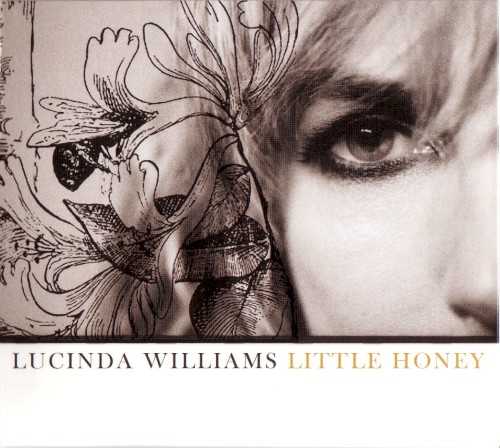 | Album: 12 of 19 Title: Little Honey Released: 2008-10-13 Tracks: 14 Duration: 1:09:36 Scroll: Up Down Top Bottom 25% 50% 75% Spotify Allmusic Wikipedia AlbumCover | 1 Real Love (03:45) 2 Circles and Xs (03:41) 3 Tears of Joy (04:27) 4 Little Rock Star (05:43) 5 Honey Bee (03:05) 6 Well Well Well (04:29) 7 If Wishes Were Horses (05:41) 8 Jailhouse Tears (05:28) 9 Knowing (06:00) 10 Heaven Blues (05:23) 11 Rarity (08:43) 12 Plan to Marry (03:26) 13 Its a Long Way to the Top (04:56) 14 Jailhouse Tears (alternate early version) (04:47) |
| Little Honey : Allmusic album Review : Lucinda Williams has made a career of writing terrific unrequited love songs, shattered ballads, and sexually liberated tomes drenched in blues, country, folk and rock. Since her breakthrough on 1998s Car Wheels on a Gravel Road, shes actually recorded quite regularly; Little Honey is her fourth studio album this decade so far and fifth overall -- in the 90s she released a total of two. Williams throws some more change-ups into the mix this time. For starters, this is the most polished and studied record shes ever made. Produced by Eric Liljestrand and Tom Overby, its sound is utterly contemporary, though its forms are rooted in electric 70s rock as well as her fallbacks on blues and old-school Americana. The set opens with the rollicking "Real Love," with jangling, charging guitars by Doug Pettibone, and Rob Burger on Wurlitzer, and a backing chorus held down by the Bangles Susanna Hoffs and Matthew Sweet. Its pop/rock bent is tempered by the roiling pace and Williams trademark Louisiana voice. But its a startling introduction to an album that, while produced with a certain conscious flair, is the most loosely focused of her career in terms of her songwriting. Williams can still write the beautiful cut-time country tunes, such as the ballad "Circles and Xs" and the honky tonk "Jailhouse Tears," a fun throwaway duet with Elvis Costello, and a backing chorus that includes Jim Lauderdale. The blues make their appearance on the beautiful "Tears of Joy" and the appropriately titled "Heaven Blues," a song that references her late mother and redemption, with excellent slide work by Pettibone. Greasy, punched up guitar rock is what fuels the sexually charged "Honey Bee," and a cover of AC/DCs "Long Way to the Top" (though her arrangement on the latter doesnt work). Theres also the beautiful, but lyrically indulgent, "Little Rock Star" a warning to the unnamed talents who live in the self-made hell of excess. Williams should know. The albums longest cut is "Rarity," a poignantly gorgeous, heartfelt, cough-syrup tribute to an unnamed but very talented peer. It features Hoffs and Sweet, and a lovely gospel horn arrangement by Bruce Fowler. Its languid, lazy pace is atmospheric and draws itself out over eight minutes making for one of the most memorable moments here. Quoting Williams lyrics out of context doesnt serve for this record, because they are more directly song lyrics than the poetry shes crafted in song form before. Upon first listen Little Honey is quite jarring for all of its textural and production shifts and dodges, but in time it settles into the listener as a mixed collection of decent songs that pack some punch, but no jaw-dropping wallops. The faithful will no doubt enjoy this set, but the novice should look to earlier albums to discover what all the critical fuss has been about these last 25 years. | ||
 | Album: 13 of 19 Title: Lu In 08 Released: 2008-10-28 Tracks: 4 Duration: 19:48 Scroll: Up Down Top Bottom 25% 50% 75% Spotify AlbumCover | 1 For What Its Worth (04:33) 2 Masters of War (07:36) 3 Marching the Hate Machines (03:58) 4 Bone of Contention (03:41) |
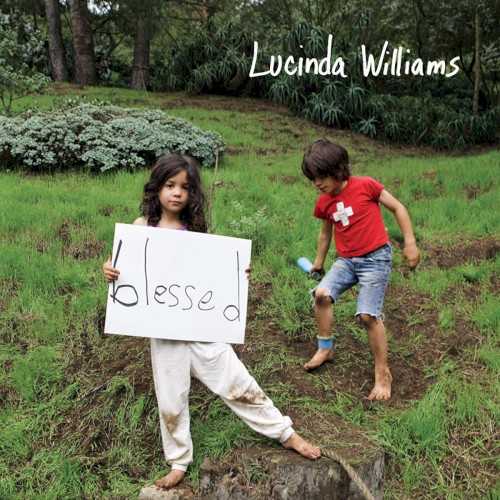 | Album: 14 of 19 Title: Blessed Released: 2011-02-28 Tracks: 12 Duration: 59:07 Scroll: Up Down Top Bottom 25% 50% 75% Spotify Wikipedia Allmusic AlbumCover | 1 Buttercup (03:50) 2 I Don’t Know How Youre Livin’ (04:59) 3 Copenhagen (04:30) 4 Born to Be Loved (04:37) 5 Seeing Black (05:14) 6 Soldier’s Song (06:09) 7 Blessed (05:48) 8 Sweet Love (03:33) 9 Ugly Truth (04:22) 10 Convince Me (05:45) 11 Awakening (06:25) 12 Kiss Like Your Kiss (03:51) |
| Blessed : Allmusic album Review : From its cover in, Lucinda Williams Blessed stands out. It title is readily visible in color photographs of anonymous citizens holding handmade signs, yet her name appears nowhere but the spine. The songs on Blessed are equally jarring: they offer sophisticated changes in her lyric oeuvre, extending their reach beyond first-person narratives of unrequited love and loss. She adorns these new tomes with roots rock and blues melodies dynamically illustrated by Don Was sure-handed production (with assistance from Eric Liljestrand and husband Tom Overby. Her voice is front and center, but Was pushes an edgy, tight backing band -- fueled by Greg Leiszs and Val McAllums guitars and Rami Jaffees B-3 -- to frame it in greasy, easy grooves. Some guests who appeared on 2008s Little Honey -- notably Matthew Sweet and Elvis Costello -- return here. Set opener "Buttercup" is a rollicking kiss-off to a former boyfriend in which Williams simply lays out the truth as she sees it amid a strident rock & roll cadence. The guitars swell and fade while the B-3 swirls around her voice and the low-end drums hammer her vocal accents home. On the overdriven "Seeing Black," written for the late Vic Chesnutt, Williams, buoyed by an uncharacteristically scorching guitar break from Costello, offers no judgment; she simply questions his spirit as she struggles to accept the loss. Acceptance is a key theme on Blessed; its voiced in the languid country rock of "I Dont Know How Youre Living," with its pledge of unconditional love and support, and in the rumbling, explosive "Awakening." (An extension of "Atonement" from World Without Tears). But theres a militancy thats insisted upon here: it testifies to the willingness and resilience of the human heart. "Soldiers Song," written from a servicemans point of view in a war zone, juxtaposes home and the new place he finds himself standing. In the late-night blues of "Born to Be Loved" and in the garagey title track, Williams employs repetitive, poetic lyrics that could be chanted as well as sung; in her honeyed Louisiana drawl, however, they become as sensual as a sunset in late summer. The two love songs near the records end alternately express raw need and abundance. The unabashed humility in pleading on "Convince Me" is signified by a Southern R&B groove. "Kiss Like Your Kiss" closes the set two cuts later -- in waltz time -- by expressing gratitude for the abundant romantic love her protagonist experiences. Its painted by washes of lilting guitars, strings, and vibes. Blessed is Williams most focused recording since World Without Tears; it stands with it and her 1988 self-titled Rough Trade as one of her finest recordings to date. Its shift in lyric focus is amplified by the care and detail in the albums production and crackling energy. By deliberately shifting to a harder-edged roots rock sonic palette, Blessed moves Williams music down the road from the dead-end Americana ghetto without compromising her qualities as a songwriter or performer. | ||
 | Album: 15 of 19 Title: iTunes Live: SXSW Released: 2011-03-18 Tracks: 6 Duration: 30:55 Scroll: Up Down Top Bottom 25% 50% 75% AlbumCover | 1 Born to Be Loved (05:07) 2 Convince Me (05:47) 3 Come On (04:33) 4 Unsuffer Me (06:42) 5 Honey Bee (03:08) 6 Blessed (05:38) |
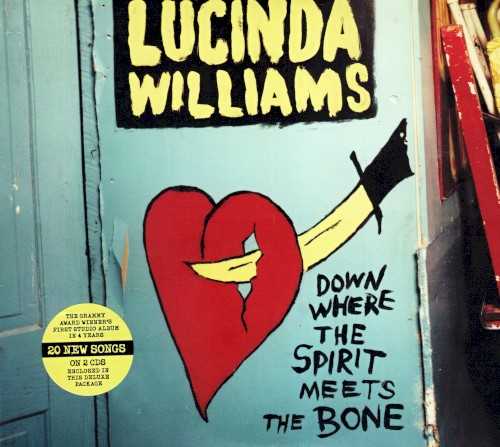 | Album: 16 of 19 Title: Down Where the Spirit Meets the Bone Released: 2014-09-26 Tracks: 20 Duration: 1:43:06 Scroll: Up Down Top Bottom 25% 50% 75% Spotify Allmusic Wikipedia AlbumCover | 1 Compassion (02:57) 2 Protection (04:47) 3 Burning Bridges (04:49) 4 East Side of Town (04:56) 5 West Memphis (05:44) 6 Cold Day in Hell (05:16) 7 Foolishness (05:57) 8 Wrong Number (05:01) 9 Stand Right by Each Other (03:59) 10 It’s Gonna Rain (04:18) 1 Something Wicked This Way Comes (05:45) 2 Big Mess (05:32) 3 When I Look at the World (04:56) 4 Walk On (04:11) 5 Temporary Nature (Of Any Precious Thing) (05:05) 6 Everything but the Truth (05:11) 7 This Old Heartache (05:03) 8 Stowaway in Your Heart (03:27) 9 One More Day (06:21) 10 Magnolia (09:51) |
| Down Where the Spirit Meets the Bone : Allmusic album Review : Lucinda Williams has never had a comfortable relationship with the commercial side of the recording industry -- her battles with various major labels in the 90s are the stuff of legend -- and even though she had a reasonably stress-free partnership with Lost Highway Records from 2001s Essence to 2011s Blessed, it seems fitting that she would eventually decide to strike out on her own. 2014s Down Where the Spirit Meets the Bone is Williams first album for her own label, Highway 20 Records, giving her complete control over the creative process, and though this doesnt always sound like an album where Williams is challenging herself musically, for a musician who has long believed in the power of nuance, this is an album that feels unerringly right for her, full of sweet and sour blues, acoustic pondering, and simple, bare bones rock & roll that slips into the groove with Williams literate but unpretentious songs. Love and its infinite complexities have always been some of Williams favorite themes, and they certainly pop up a few times on this double set, but she has just as much (if not more) to say about the world around her this time out, setting one of her fathers poems to music as she pleads for "Compassion," spits venom at a dilettante from the perspective of someone living in poverty in "East Side of Town," recounts a real-life tale of justice gone wrong in "West Memphis," and issues a call to action on "Temporary Nature (Of Any Precious Thing)." Williams also gives herself plenty of room to stretch out on Down Where the Spirit Meets the Bone, offering 20 songs spread out over two discs and running an hour-and-44-minutes, and despite its epic scale, there seems to be precious little filler here; if these songs sometimes take a while to find their spiritual and emotional center, they invariably get there, and the powerful litanies of "Wrong Number," "Something Wicked This Way Comes," and "Big Mess" mesh comfortably with the implacable rhythm of this music. Williams produced the sessions with Tom Overby and Greg Leisz, and the performances are steeped in deep, satisfying grooves, with Pete Thomas and Davey Faragher of Elvis Costellos Imposters holding down the rhythm on most tracks and Leisz, Stuart Mathis, Bill Frisell, and Tony Joe White among the guitarists who lend their magic to these recordings. Down Where the Spirit Meets the Bone is the sound of Lucinda Williams doing what she does best and letting her muse do the speaking, and if that sounds simple, in practice it is and it isnt -- this music is taut and soulful, but also a document of one woman baring her spirit and mind to the world, which has always been the case with her best music, and if this isnt a masterpiece, its as pure, straightforward, and compelling as anything shes done since Essence. | ||
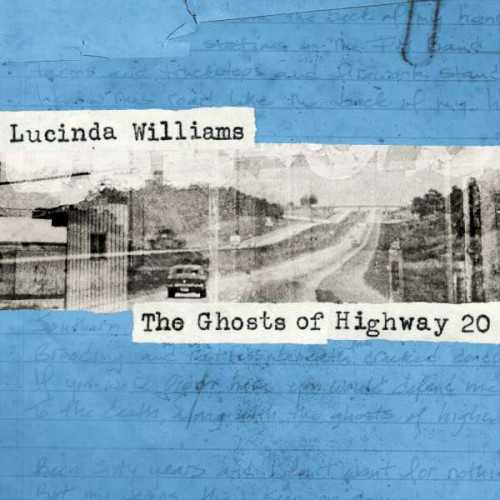 | Album: 17 of 19 Title: The Ghosts of Highway 20 Released: 2016-02-05 Tracks: 14 Duration: 1:26:14 Scroll: Up Down Top Bottom 25% 50% 75% Spotify Allmusic AlbumCover | 1 Dust (06:19) 2 House of Earth (05:28) 3 I Know All About It (05:46) 4 Place in My Heart (05:13) 5 Death Came (06:14) 6 Doors of Heaven (05:33) 7 Louisiana Story (09:05) 1 Ghosts of Highway 20 (07:20) 2 Bitter Memory (04:07) 3 Factory (04:01) 4 Cant Close the Door on Love (05:36) 5 If My Love Could Kill (05:09) 6 If Theres a Heaven (03:34) 7 Faith & Grace (12:42) |
| The Ghosts of Highway 20 : Allmusic album Review : Calling her own shots seems to agree with Lucinda Williams. While the singer/songwriter has long had a reputation for taking her time between albums, shes back with another double-disc set, The Ghosts of Highway 20, just a year-and-a-half later. She launched her own label with Down Where the Spirit Meets the Bone in the fall of 2014. In many ways, The Ghosts of Highway 20 feels like a companion piece to Down Where the Spirit Meets the Bone in its emotionally direct approach and willingness to let the songs play themselves out at their own pace. -- they drift with the current, but they dont meander, and they get where theyre going in their own sweet time. Most of the performances on Highway 20 are anchored by the guitar interplay of Bill Frisell and Greg Leisz (the latter also co-produced the album with Williams and Tom Overby), and while their performances seem low on flash, especially given the estimable talents of these players, they have a faultless instinct for the moods and rhythms of these songs, and this is an album where nuance truly takes center stage. However, while Down Where the Spirit Meets the Bone was an album that covered a wide variety of themes, the 14 songs on The Ghosts of Highway 20 all seem to turn on some sort of struggle -- against depression ("Dust"), against the limitations of our lives on Earth ("Doors of Heaven"), against the past ("Bitter Memory" and the title song), and against betrayal ("I Know All About It"). Even as Williams calls up nostalgic images of life in Louisiana ("Louisiana Story"), shes still trying to free herself from memories of hurts inflicted by her loved ones, and her appeals to the Lord for guidance and peace ("If Theres a Heaven" and "Faith & Grace") sound and feel sincere, as if the shackles of her physical being are just too much for her. Williams vocal performances here represent a remarkable high-wire act, as she brings her emotions to the surface without resorting to histrionics. Her musical adaptation of Woody Guthries "House of Earth," a curiously erotic dialogue between a whore and a customer, is all the more striking for its refusal to play broad. After releasing one of the best and boldest albums of her career with Down Where the Spirit Meets the Bone, Williams goes from strength to strength with The Ghosts of Highway 20, and it seems like a welcome surprise that shes moving into one of the most fruitful periods of her recording career as she approaches her fourth decade as a musician. | ||
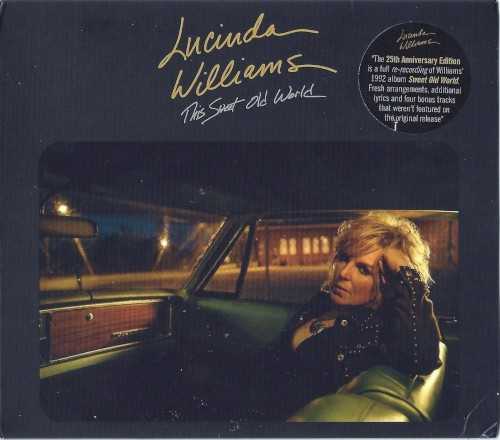 | Album: 18 of 19 Title: This Sweet Old World Released: 2017-09-29 Tracks: 16 Duration: 1:11:06 Scroll: Up Down Top Bottom 25% 50% 75% Spotify Allmusic AlbumCover | 1 Six Blocks Away (04:13) 2 Prove My Love (04:53) 3 Something About What Happens When We Talk (04:44) 4 Memphis Pearl (04:19) 5 Sidewalks of the City (05:23) 6 Sweet Old World (04:45) 7 Little Angel, Little Brother (04:42) 8 Pineola (04:18) 9 Lines Around Your Eyes (02:45) 10 Drivin Down a Dead End Street (06:06) 11 Hot Blood (06:19) 12 Which Will (04:31) 13 Factory Blues (03:36) 14 What You Dont Know (03:52) 15 Wild and Blue (03:31) 16 Dark Side of Life (03:02) |
| This Sweet Old World : Allmusic album Review : Re-recording a back catalog is a calculated risk for most artists. While hindsight may give musicians a wiser perspective than they had years before, it also encourages some people to fix things that werent really broken. And more often than not, the motivation to recut older material is to get a second payday out of a set of songs rather than revealing a new creative perspective. Both art and commerce may have been factors in Lucinda Williams decision to take another shot at the songs from her 1992 album, Sweet Old World. Williams famously battled producers, A&R; men, and label executives for control while making the original album, and it was recorded for a label that has since gone out of business, so chances are good shes not getting royalties for it anymore. For whatever reason, 2017s This Sweet Old World finds Williams remaking the songs from her 1992 release, sometimes faithfully and sometimes with fresh arrangements and lyrical revisions. ("He Never Got Enough Love" even gets a new chorus and title, "Drivin Down a Dead End Street.") From a musical standpoint, This Sweet Old World is a genuine improvement over the original LP. Here Williams is backed by her road band, and they give the material an approach that feels more organic, especially with Stuart Mathis on guitar, while their push-and-pull with Williams vocals boasts more nuance. These recordings also lack the very dated drum sounds and production decisions that feel like flaws 25 years after Sweet Old World was first released. But the double-edged sword here is Williams vocals. On Sweet Old World, she often sounded like she was still learning how to best interpret her material, and she occasionally seemed clumsy and unsure, though never less than emotionally honest. This Sweet Old World is the work of a far more confident and experienced vocalist, and her phrasing here generally works better. However, her voice at the age of 64 is considerably grainier and less supple that it was at 39, and if her technique has improved with time, her instrument most certainly has not. Williams is hardly a bad vocalist on This Sweet Old World, but the inevitable comparisons to the earlier recordings of this material are not flattering, and thats the biggest stumbling block for old fans giving this a listen. One thing is certain: in either version, this is a set of great songs from a master tunesmith, and Williams performs her material with greater intelligence and soul than anyone else could muster. When you remember that Emmylou Harris once covered the title track of Sweet Old World, you know thats no small accomplishment. | ||
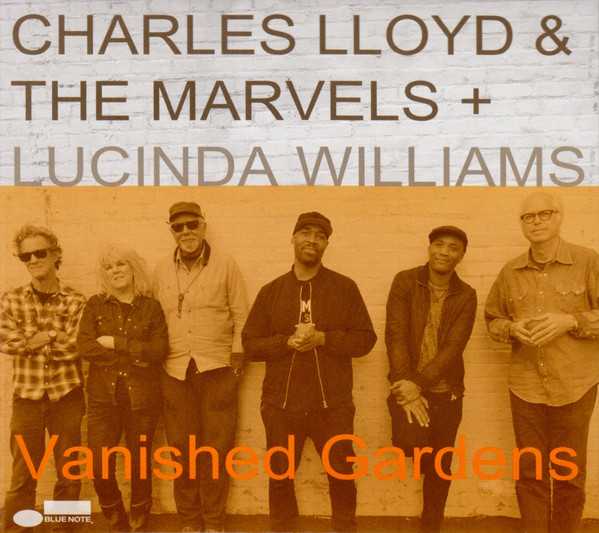 | Album: 19 of 19 Title: Vanished Gardens Released: 2018-06-29 Tracks: 10 Duration: 1:13:20 Scroll: Up Down Top Bottom 25% 50% 75% Spotify AlbumCover | 1 Defiant (08:41) 2 Dust (07:58) 3 Vanished Gardens (09:03) 4 Ventura (06:22) 5 Ballad of the Sad Young Men (06:17) 6 We’ve Come Too Far To Turn Around (06:30) 7 Blues For Langston and LaRue (05:38) 8 Unsuffer Me (11:40) 9 Monk’s Mood (05:15) 10 Angel (05:53) |